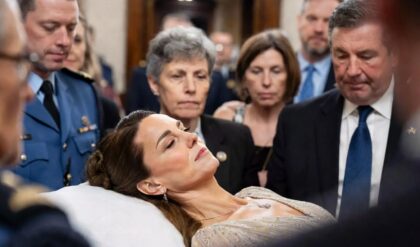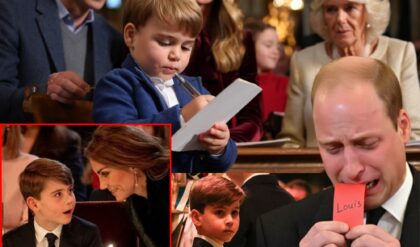I was 15, dreaming of a music competition, but my whole family mocked me and called it a delusion. My parents only loved my little brother and truly despised me. On the day of the contest, they locked me in my room.
The hallway smelled of lemon polish and my mother’s disappointment the morning the regional music competition packets arrived. I was fifteen, clutching the glossy flyer like contraband. The grand prize: a scholarship to the state conservatory, a real stage, a chance to prove the voice in my throat wasn’t just noise. I slid it across the breakfast table. Dad didn’t look up from his phone. Mom stirred oatmeal that would go cold before anyone ate it. My little brother, Ethan—eight and already their sun—kicked the table leg in rhythm with whatever game blared from his tablet.
“Another singing thing?” Mom sighed, the way she sighed when the dog tracked mud. “Lily, you’re embarrassing yourself.”
Dad snorted. “Conservatory? With what money? You sound like a dying cat.”
Ethan giggled, milk dribbling down his chin. “Dying cat! Dying cat!”
I swallowed the words I wanted to scream and folded the flyer into a square small enough to hide in my sock. That night I practiced in the laundry room, door locked, voice muffled against the dryer’s hum. The walls shook with Ethan’s cartoons next door. I sang anyway—Ave Maria, soft, then louder, until the notes felt like wings.
The competition was Saturday, three weeks away. I forged Mom’s signature on the permission slip, paid the fee with babysitting cash I’d hidden in a tampon box. Every rehearsal, I told myself: one more week, one more day, one more hour.
The night before the audition, I laid out my dress—black velvet, thrift store, hem let out twice. I set my alarm for 5:30 a.m. At 6:00 p.m., Dad’s key turned in the front lock. I heard the clink of his belt, the thud of his boots. Then my bedroom door—click. The deadbolt slid home from the outside. I rattled the knob. Nothing.
“Lily needs to learn priorities,” Mom called through the wood. “Ethan has a soccer tournament tomorrow. We’re a family. We stick together.”
I pounded until my fists bruised. “Let me out! I have to be there at eight!”
Ethan’s voice, sing-song: “Dying cat stays in the cage!”
Their footsteps faded. The house went dark except for the aquarium glow under my door. I tried the window—painted shut since Ethan was born. I pried at the hinges with a nail file. The metal screamed. No use.
I sat on the carpet, knees to chest, counting heartbeats. The clock blinked 7:14 p.m. The competition started at 8:00. Forty-six minutes by bus. I was trapped in a house that had never felt like home.
At 7:28, a soft knock—three taps, pause, two taps. Mrs. Delgado from next door. I’d watered her roses all summer for extra cash. She pressed her mouth to the crack beneath the door. “Lily? Your light’s on. Everything okay?”
I whispered the story in a rush—locked, competition, scholarship, please. Silence. Then the jangle of keys. She’d kept a spare since the time Mom forgot hers at the mall.
The deadbolt slid back. Mrs. Delgado stood in the hallway, gray hair escaping her bun, eyes fierce behind bifocals. She wore garden clogs and a nightgown printed with lemons. “Get your dress. We’re taking my car.”
We ran. The velvet snagged on the rosebushes. Her old Civic smelled of potting soil and peppermint gum. She drove like someone half her age, tires squealing around corners, radio off so I could warm up. Ave Maria again, this time with the engine’s rumble as percussion.
We pulled into the performing arts center at 7:56. The parking lot was chaos—minivans, nervous parents, kids clutching violin cases like life rafts. I bolted, shoes slipping on ice. Mrs. Delgado yelled after me, “Break a leg, mija!”
Backstage smelled of rosin and hairspray. The stage manager, clipboard clutched like a shield, barked, “Name?”
“Lily Chen. Solo soprano. Number 47.”
“You’re late. You’ve got four minutes.”
I pinned my number to my dress with shaking fingers. The girl before me finished—some flute piece, polite applause. My name crackled over the speakers. I stepped into the lights.
The auditorium was bigger than I’d imagined. Rows of faces blurred into darkness. Judges in the front, pens poised. I couldn’t see my family—because they weren’t there. I saw Mrs. Delgado in the back, standing, fists clenched like she was ready to fight the world for me.
The piano intro began. I closed my eyes. The first note came out small, then grew—clear, steady, mine. I sang about a mother who wasn’t mine, about grace I’d never been given. The high B floated, unbroken. When I finished, the silence lasted three heartbeats. Then applause—real, rolling, the kind that makes your ribs vibrate.
I bowed, tears hot on my cheeks. The judges conferred. Number 47, they called. First place. Scholarship. Full ride.
Backstage, Mrs. Delgado hugged me so hard my feet left the ground. “Your parents are idiots,” she whispered. “But you? You’re a miracle.”
We drove home at noon. The house was quiet—soccer tournament, I guessed. My trophy sat on the passenger seat, gold plastic gleaming. Mrs. Delgado parked in her driveway. “You’re staying with me until they remember how to be human.”
That night I slept in her guest room, window open to the scent of frost and freedom. My phone buzzed—texts from classmates, videos of my performance already online. One from Mom: Where are you? Ethan scored two goals.
I didn’t answer.
Three days later, the conservatory called. Dorm assignment, orientation packet, a mentor who’d sung at the Met. I packed one suitcase. Mrs. Delgado drove me to the bus station. She pressed a twenty into my hand. “For sheet music. And coffee. You’ll need both.”
The bus pulled away. I watched our street shrink in the rear window—my house with its locked doors, Ethan’s soccer ball abandoned on the lawn, Mom’s curtains still drawn. I didn’t look back again.
At the conservatory, my roommate played cello. We practiced until the dorm RA banged on the walls. I sent Mrs. Delgado postcards—new arias, first recital, the way the practice rooms smelled of wood and possibility. She sent back clippings: my competition video had gone viral locally. Local Girl Defies Family, Wins Scholarship. My parents were quoted. Mom: “We’re so proud.” Dad: “She gets her stubbornness from me.”
I didn’t call.
Years later, when I sang my first paid gig—Carnegie Hall, small stage, big dream—I dedicated the encore to “the neighbor who believed before anyone else did.” Mrs. Delgado watched from row seven, lemons on her dress faded but still bright. She stood first. The ovation lasted eight minutes. I counted.
Afterward, in the green room, a reporter asked about my family. I smiled the way I’d practiced in mirrors. “I have one,” I said. “She waters roses and drives like the devil. She taught me that home isn’t where they lock the doors. It’s where they hand you the key.”





